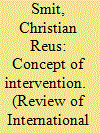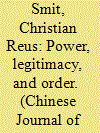|
|
|
Sort Order |
|
|
|
Items / Page
|
|
|
|
|
|
|
| Srl | Item |
| 1 |
ID:
124130


|
|
|
|
|
| Publication |
2013.
|
| Summary/Abstract |
Since the end of the Cold War, the number of books and articles on intervention in world politics has grown dramatically. Yet curiously little of this work subjects the concept of intervention itself to critical scrutiny. Scholars often preface their analyses with definitional discussions about what intervention is, but these definitions take a common form, conceiving intervention within a 'sovereignty frame'. This article questions this conception of intervention, arguing that it distorts our understanding of interventionary practices and forms of reasoning that occurred in non-sovereign international orders. After exploring the sovereignty framing of intervention in greater detail, I advance an alternative conception. International orders are systemic configurations of political authority: they comprise multiple units of such authority, each with its own realm of jurisdiction, organised according to some principle of differentiation. Importantly, this principle need not be territorial: it could be functional, for example. International intervention is the transgression of a unit's realm of jurisdiction, conducted by other units in the system. Unlike the sovereign framing of intervention, this conception is equally applicable to the interventionary ideas and practices of diverse international orders, and provides a better basis on which to understand how thinkers in different historical contexts have reasoned about intervention.
|
|
|
|
|
|
|
|
|
|
|
|
|
|
|
|
| 2 |
ID:
133957


|
|
|
|
|
| Publication |
2014.
|
| Summary/Abstract |
Legitimacy is not something distinct from power; it is one of the vital sources of power. And if power shapes the nature and development of international orders, then the politics of legitimacy features prominently in the construction, maintenance, and dissolution of such orders. This article begins by exploring the concepts of power and legitimacy, their theoretical interconnection, and the impact that crises of legitimacy have on the maintenance of political power. It then takes an empirical turn, examining, however briefly, two sites in which the politics of legitimacy had a profound effect on the development of the modern international order. The first concerns the globalization of the system of sovereign states, a four-century long process of imperial extension, crisis, and fragmentation into successor states, a process in which struggles over individual rights played a key role. The second concerns the definition and distribution of special responsibilities for managing functional challenges among states. In orders characterized by formal sovereign equality, on the one hand, and imbalances of material capabilities, on the other, a mechanism needs to be found for containing and harnessing power to meet the problems faced by the international community. Historically, this has been achieved through the allocation of special responsibilities to particular states, usually great powers. But if regimes of special responsibilities create patterns of more or less formal hierarchy among states, they are also sites of intense battles over legitimacy.
|
|
|
|
|
|
|
|
|
|
|
|
|
|
|
|
|
|
|
|
|